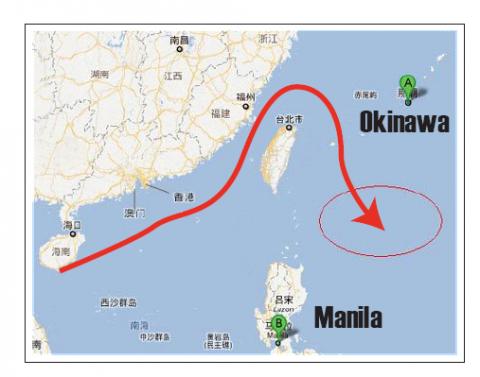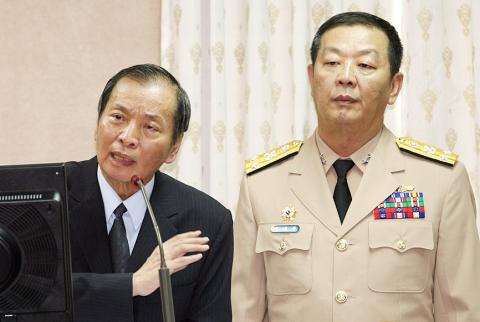The Ministry of National Defense is paying close attention to ongoing maneuvers southeast of Taiwan by a fleet of Chinese navy vessels that includes one of the heaviest combat ships in the People’s Liberation Army Navy.
According to Japanese media, the Japan Self-Defense Forces first spotted the group of five Chinese vessels 650km southwest of Okinawa on Sunday after they had crossed the Strait of Miyako.
The five vessels from the Chinese navy’s South Sea Fleet — Type 052B destroyers Guangzhou and Wuhan; Type 054A frigates Yulin and Chaohu; and Type 071 landing platform dock (LPD) Kunlun Shan — left from Hainan Island and entered the Taiwan Strait, before making a right turn about 180km off Taiwan.

At 18,000 tonnes, the Kunlun Shan is one of the largest combat vessels in the Chinese navy. The LPD, which can support a reinforced battalion of as many as 800 marines and can carry landing craft and medium-sized helicopters, took part in anti-piracy operations in the Gulf of Aden in 2010.
After entering the Pacific, the vessels conducted tactical formation and helicopter training missions in international waters about halfway between Taiwan and the main Philippine island of Luzon.
Aside from a Taiwan contingency, Chinese LPDs could play a crucial role in operations in the South China Sea against countries such as the Philippines and Vietnam, with which Beijing has become embroiled in disputes over contested islets.

Photo: CNA
Commenting on the developments, Deputy Minister of National Defense Chao Shih-chang (趙世璋) told the legislature’s Foreign Affairs and National Defense Committee yesterday that the ministry was closely monitoring the Chinese fleet and that it would continue to pay attention to its movements.
“Because the fleet is in international waters, its presence does not threaten Taiwan’s security for the moment,” he said.
Chao said the ministry believed the Chinese fleet was on a routine training exercise and that it was normal for any country to train their navy in international waters.
An unnamed navy official told the Chinese-language Liberty Times (the Taipei Times’ sister newspaper) that the navy was studying the fleet’s intentions and monitoring whether it would -return to China by the same route or move to another area.
The rapidly modernizing Chinese navy has increased the frequency of its sorties in recent years. A number of those, the latest in February, have made encirclement-like maneuvers around Taiwan.
Many sorties have also taken Chinese vessels to waters near Japan and beyond the first island chain, which Beijing regards as an artificial line preventing it from breaking out as a sea power.
On April 29, three Chinese warships — Type 054A frigates Zhoushan and Xuzhou; and the electronic reconnaissance and missile tracking ship Beijixing — were seen 430km west of the Japanese island of Yakushima in Kagoshima Prefecture. It was the first time in nine years that Chinese navy vessels had passed through the Osumi Strait, which serves as a main transit route for the US Seventh Fleet.
Late last month, the Japanese military reported that Japan Air Self-Defense Force fighter aircraft were scrambled 156 times in response to Chinese naval aircraft approaching Japanese airspace last year, a record high since the Japanese military started releasing such data by country in 2001.
Japan said that flight patterns by Chinese aircraft had diversified, with intelligence-gathering planes becoming increasingly involved.
Additional reporting by Rich Chang

Tropical Storm Gaemi strengthened into a typhoon at 2pm yesterday, and could make landfall in Yilan County tomorrow, the Central Weather Administration (CWA) said yesterday. The agency was scheduled to issue a sea warning at 11:30pm yesterday, and could issue a land warning later today. Gaemi was moving north-northwest at 4kph, carrying maximum sustained winds near its center of up to 118.8kph and gusts of 154.8kph. The circumference is forecast to reach eastern Taiwan tomorrow morning, with the center making landfall in Yilan County later that night before departing from the north coast, CWA weather forecaster Kuan Shin-ping (官欣平) said yesterday. Uncertainty remains and

SEA WARNING LIKELY: The storm, named Gaemi, could become a moderate typhoon on Wednesday or Thursday, with the Taipei City Government preparing for flooding A tropical depression east of the Philippines developed into a tropical storm named Gaemi at 2pm yesterday, and was moving toward eastern Taiwan, the Central Weather Administration (CWA) said. Gaemi could begin to affect Taiwan proper on Tuesday, lasting until Friday, and could develop into a moderate typhoon on Wednesday or Thursday, it said. A sea warning for Gaemi could be issued as early as Tuesday morning, it added. Gaemi, the third tropical storm in the Pacific Ocean this typhoon season, is projected to begin moving northwest today, and be closest to Taiwan on Wednesday or Thursday, the agency said. Today, there would likely

DISRUPTIONS: The high-speed rail is to operate as normal, while several airlines either canceled flights or announced early departures or late arrivals Schools and offices in 15 cities and counties are to be closed today due to Typhoon Gaemi, local governments announced last night. The 15 are: Taipei, New Taipei City, Taoyuan, Tainan, Keelung, Hsinchu and Kaohsiung, as well as Yilan, Hualien, Hsinchu, Miaoli, Chiayi, Pingtung, Penghu and Lienchiang counties. People should brace for torrential rainfall brought by the storm, with its center forecast to make landfall on the east coast between tonight and tomorrow morning, the Central Weather Administration (CWA) said. The agency issued a sea warning for the typhoon at 11:30pm on Monday, followed by a land warning at 11:30am yesterday. As of

CASUALTY: A 70-year-old woman was killed by a falling tree in Kaohsiung as the premier warned all government agencies to remain on high alert for the next 24 hours Schools and offices nationwide are to be closed for a second day today as Typhoon Gaemi crosses over the nation, bringing torrential rain and whipping winds. Gaemi was forecast to make landfall late last night. From Tuesday night, its outer band brought substantial rainfall and strong winds to the nation. As of 6:15pm last night, the typhoon’s center was 20km southeast of Hualien County, Central Weather Administration (CWA) data showed. It was moving at 19kph and had a radius of 250km. As of 3pm yesterday, one woman had died, while 58 people were injured, the Central Emergency Operation Center said. The 70-year-old